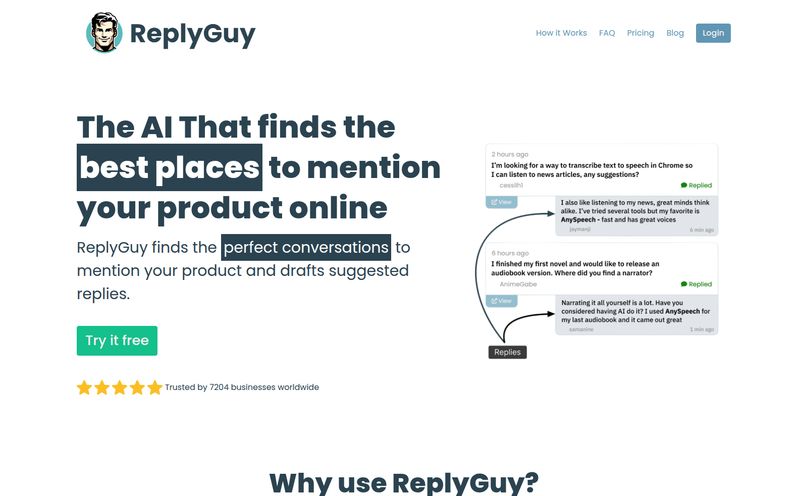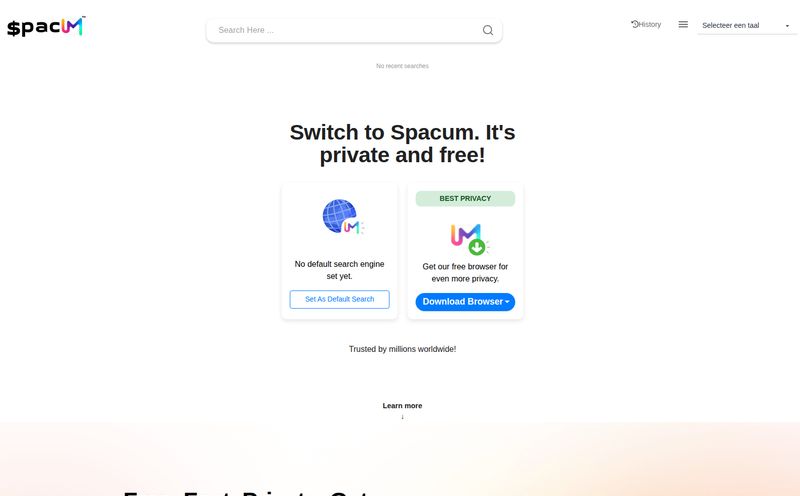Ever find yourself staring at a browser with 27 tabs open? All of them are fascinating, long-form articles you swear you're going to read. One on the latest Google algorithm update, another on a new CPC strategy, a deep dive into generational marketing... your intentions are golden. But your time? Not so much. My 'Read Later' list isn't a list; it's a library of digital guilt.
A while back, a tool popped up that promised a solution. It was called Recast. And for a moment, it felt like the perfect life hack for content-hungry, time-poor professionals like us. The idea was so simple it was brilliant. But now, if you go looking for it, you’ll just find a digital ghost. A 404 error page and a cryptic farewell message.
So, what was Recast? And more importantly, where did it go? Let’s pour one out for a fallen soldier in the AI wars and talk about it.
The Simple Brilliance of Recast AI
At its core, Recast was an AI app that did one thing: it turned any article you threw at it into a short, conversational podcast. This wasn't just another robotic text-to-speech reader, the kind that mispronounces every other brand name and sounds like a GPS navigator from 2008. No, Recast’s magic trick was its format.
It created a dialogue between two AI-generated co-hosts who would discuss and break down the article's content. It was like having your own personal morning show, but instead of celebrity gossip, they were explaining the nuances of programmatic advertising or the future of link building. For anyone who spends their days neck-deep in industry blogs, this was a game-changer.

Visit Recast
Why It Felt So Right
The appeal was immediate. I could finally “read” that massive Ahrefs study while walking the dog. I could catch up on the latest from Search Engine Journal during my commute, without getting a headache from trying to read on a bumpy train. It tapped directly into the podcast boom and our collective desire to multitask our way to omniscience.
Here’s what made the concept so strong:
- It Saved Precious Time: The most obvious benefit. It transformed static reading time into productive listening time, fitting neatly into the cracks of a busy day.
- It Made Learning Engaging: Let's be honest, some technical topics can be a bit dry. The co-host format, when it worked, made complex subjects more digestible and, dare I say, entertaining. It was learning through osmosis, a casual chat instead of a lecture.
- It Fought Screen Fatigue: My eyes, and probably yours too, are tired. After a full day of staring at screens for work, the last thing I want to do is stare at another one for “leisurely” reading. Audio is a welcome escape.
I’ve always felt that the best tools aren’t the ones with the most features, but the ones that solve a specific, nagging problem in an elegant way. Recast nailed that. It took the pressure off my ever-expanding reading list and made staying informed feel less like a chore.
The Inevitable AI Tightrope Walk
Of course, the idea was one thing; the execution was another. And this is where, I suspect, the cracks began to show. Recast’s entire existence was balanced on the high-wire of AI performance, and that's a wobbly wire to walk.
The Risk of Misinterpretation
First, there's the nuance problem. SEO, marketing, tech... our fields are filled with subtleties, jargon, and inside baseball. An AI, no matter how sophisticated, can struggle with this. It might oversimplify a complex point to the verge of being wrong, or miss the sarcastic tone in a writer's argument. I imagine a Recast podcast trying to explain John Mueller's latest cryptic tweet—it could either be brilliant or a complete mess, with very little middle ground. The quality was always a hostage to the AI’s interpretive dance.
Garbage In, Podcast Out
The platform was also entirely dependent on the quality of the source material. A well-structured, clearly written article from a reputable source like the Moz Blog would probably translate beautifully. But what about a messy, ad-riddled blog post with poor formatting? The classic GIGO principle—Garbage In, Garbage Out—applies tenfold here. An AI can’t spin gold from straw, and a poorly written article would likely result in a confusing, nonsensical podcast.
The Ghost in the Machine: So, What Actually Happened?
If you try to visit the Recast website today, you’re greeted with a polite but firm 404 error from GitHub Pages. The service is gone. An image floating around shows a final message on their site: “This was recast... Now we are sliding into the future.”
So what gives? While there’s no official public statement I can find, we can make some educated guesses based on years of watching startups in this space.
My money is on a combination of factors:
- The Cost of AI: Running the AI models needed to parse text, generate scripts, and synthesize two distinct, high-quality voices is not cheap. The server costs alone can be astronomical, especially if you have a free tier, which many new apps do to gain traction.
- Monetization Hurdles: How do you charge for this? A monthly subscription? Pay-per-article? Without pricing information ever being widely available, it seems they never quite figured out a sustainable model before the runway ran out.
- Fierce Competition: While the co-host idea was unique, the broader text-to-audio space is crowded. You have established players like Audm and Curio (which use human narrators), and increasingly powerful, built-in “read aloud” functions in browsers like Edge and apps like Pocket. Not to mention standalone AI voice tools like ElevenLabs are getting scarily good, allowing anyone to create their own audio.
It’s the classic startup story. A brilliant idea, a promising launch, and then the harsh reality of operational costs and market competition. Recast walked so that other, future apps might run.
The Future is Audio, But What Kind?
The demise of Recast doesn't mean the idea was bad. Far from it. It proves there's a real hunger for more dynamic, accessible ways to consume written content. The trend of turning everything into audio isn't going away. We're just in the experimental phase, figuring out what works.
Will the future be human-narrated articles, AI-powered summaries, or something else entirely? I think the answer is ‘yes’ to all of the above. Niche subscription services for high-quality human narration will thrive, while AI will fill the gap for the sheer volume of content we want to get through. Perhaps the next iteration will integrate directly into platforms like Substack or Medium, offering creators an easy way to add an audio version to their posts.
For me, Recast was a glimpse into a more convenient future. It was an ambitious swing for the fences, and even though it struck out, you have to admire the attempt. It perfectly identified a pain point and tried to solve it with a creative splash of technology.
Frequently Asked Questions About Recast AI
- What exactly was Recast AI?
- Recast was an application that used artificial intelligence to convert written articles from the web into short, conversational podcasts. Instead of a single robotic voice, it featured two AI co-hosts who discussed the article's content.
- Why can't I access the Recast website anymore?
- The Recast service has been shut down. Its website now shows a 404 error page, and a final message indicated the project had come to an end. The exact reasons aren't public, but they likely involve the high costs of running AI, competition, and challenges with finding a sustainable business model.
- What was the main selling point of Recast?
- Its unique feature was the AI co-host dialogue. This made the listening experience more engaging and less monotonous than traditional text-to-speech services, turning a simple reading task into a more dynamic conversation.
- Are there any good alternatives to Recast AI now that it's gone?
- Yes, there are several alternatives, each with a different approach. For human-narrated articles from top publications, check out apps like Audm or Curio. For general text-to-speech, many apps like Pocket and Instapaper have built-in read-aloud features. And for creating your own AI audio, tools like ElevenLabs and Play.ht are powerful options.
- Was Recast a free tool?
- Information on Recast's pricing model is scarce, which suggests it was likely in a free beta or early-access phase while it was active. The difficulty of monetizing such a service was probably one of the challenges it faced.
A Fond Farewell
In the fast-moving world of AI tools, not every great idea makes it to the finish line. And that's okay. Recast was a clever, useful tool that, for a short time, made my content-consumption life a little bit easier. It was a great experiment that pushed the boundaries of what we thought was possible with text-to-audio. So, farewell, Recast. We enjoyed it thoroughly. Now, let’s see what the future brings.
Reference and Sources
- Moz Blog - for examples of high-quality SEO content.
- ElevenLabs - as an example of an advanced AI voice synthesis tool.
- Audm - as an example of a human-narrated article service.



